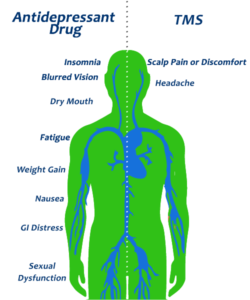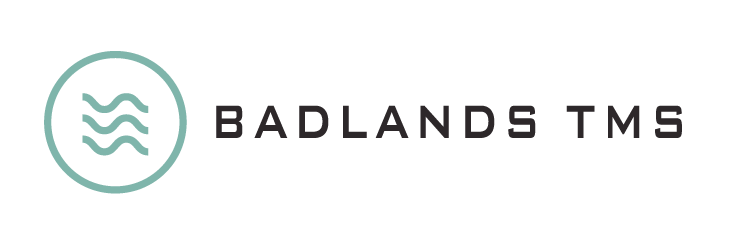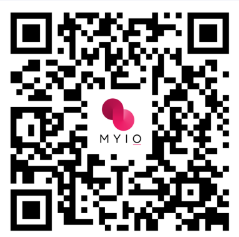What is TMS?
TMS stands for Transcranial Magnetic Stimulation
Transcranial Magnetic Stimulation treatment for depression uses gentle magnetic pulses, similar in type and strength to that of an MRI machine, to stimulate the areas of the brain that are responsible for mood control. When directed into specific areas of the brain, these electromagnetic pulses optimize blood flow, facilitate the release of neurotransmitters, and encourage the release of neurotrophic growth factor (BDNF), an important chemical that directly impacts connections between brain cells. This therapy helps treat patients with Major Depressive Disorder (MDD), Obsessive Compulsive Disorder (OCD), and anxiety, especially if medications haven’t helped. TMS is non-invasive, FDA approved and drug free. During TMS therapy sessions, patients sit and relax. Patients can resume their daily activities immediately after treatment.

A Safe and Effective Depression Treatment
TMS is a safe treatment for depression. It has minimal side effects. Some patients experience slight discomfort at site of treatment, but it quickly subsides. Most patients show a strong response to our innovative TMS treatment. Studies show that for people with Major Depressive Disorder (MDD), long-term remission becomes less likely with each prescription medication treatment attempt. As antidepressant medications increase, so can the side effects. TMS therapy helps avoid those side effects and makes recovery possible!

TMS Therapy is Long Lasting and FDA Approved
TMS for depression brings durable results. Studies show a lasting medical benefit up to (but not limited to) one year after TMS treatment for depression. That means that our patients have the chance to enjoy lasting recovery from depression without the need for long-term treatments or medications. Transcranial Magnetic Stimulation is FDA approved for treatment-resistant depression and is reimbursed by insurance. If you have insurance questions, feel free to contact us.
Take the TMS Self Assessment
There is always hope for recovery! To find out if Badlands TMS is right for you, take the self-assessment below.
This is a secure form. We promise not to share your information with anyone outside our clinic.
Candidates for TMS
If you have found little relief from depression through oral medications, TMS therapy may be an alternative treatment option, particularly if:
- You have tried 6-8 weeks of 1-4 oral antidepressants (depending on your insurance).
- You cannot tolerate the side effects of oral medications.
- You prefer a medication-free approach to treatment.
Getting Started
All new patients take this questionnaire to help our staff determine the level of depression and gather medical information. If you are a potential candidate, you will then be scheduled for an initial consultation with our psychiatric providers, who will evaluate the impact that depression has on your quality of life, your current and past medication trials, and other medical issues that may influence whether TMS therapy is right for you.
Insurance
Most major insurance providers cover TMS therapy, including Aetna, Blue Cross, Blue Shield, Cigna, First Choice Health, Medicare, Moda, Optum, Pacific Source, Providence, Regence, Tricare, and United Healthcare. Other providers may cover TMS therapy on a case-by-case basis.
Insurance providers do not cover TMS unless the patient has already had therapy and some previous medication trials (the number of medication trials varies by insurance provider).
Please email our billing department to discuss your insurance benefits.


